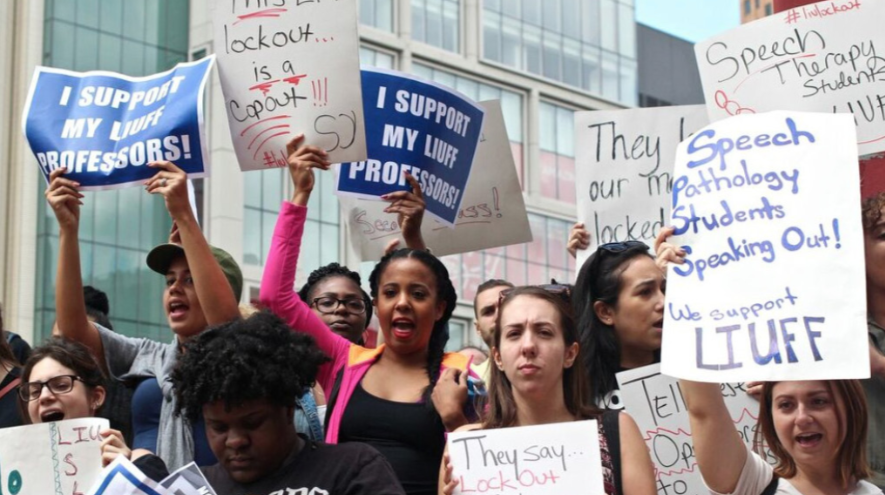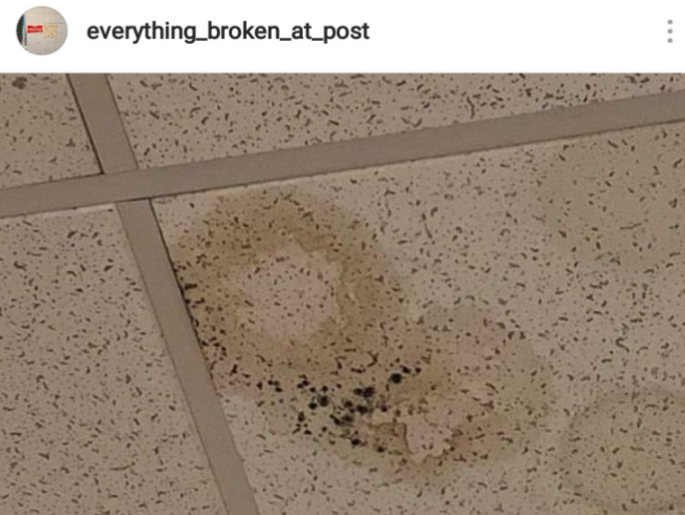By Jada Butler
Co-Editor-In-Chief
A controversial, anonymous student-written pamphlet titled, “Common Sense: Truth & Ethics, Accountability & Morals – Where have they gone?” appeared in various locations on campus, including the Little Theatre, Hillwood Commons, Pioneer newsstands in Humanities, and in the locker rooms in the Pratt Recreation Center in the days preceding Homecoming.
The pamphlet, modeled after Thomas Paine’s
“Common Sense” written in 1775-76, lists grievances of the student body and demands for University President Kimberly Cline to make changes, or to step down. The Pioneer fact-checked the statements in the pamphlet
President Cline’s Salary
The author of the “Common Sense” pamphlet brought up Preisdent Cline’s salary, saying, “In December 2016, Money magazine quoted Cline as making $859,494.000, including total compensation.”
Cline declined to comment on her salary, saying that salaries are “disclosed in IPEDS (Integrated Postsecondary Education Data System)” and it can be compared to other university presidents as an average. Cline also denied the claim that university funding was going into her salary.
Funding Decrease
The pamphlet listed a decrease in funding of scholarship awards and the Tilles Center for Performing Arts.

Director of the Tilles Center, William Biddle, said there were no cuts to the Tilles Center budget. “In fact, there have been significant capital improvements made to both Tilles Center and Krasnoff Theater,” Biddle said in an email. He also said that the Krasnoff donation does not directly affect the budget, as funds were used for capital improvements through facilities.
President Cline reported over a $100 million increase in scholarship funding in November 2017 when her tenure contract was extended.
LIU Brooklyn Faculty Lockout
“Cline’s administration and trustees are the FIRST to LOCKOUT Professors…”

This statement is true in the United States; in the 2016-17 academic year, the administration made an unprecedented decision to lockout the LIU Brooklyn faculty to prevent the repeated action of negotiations ending in strike votes for the new faculty contract. Faculty lockouts are rare, but not unheard of; in Canada, a lockout occurred in 2007 at St. Thomas University in Fredericton; more recently in May 2018, the Université du Québec à Trois-Rivières also had a faculty lock- out of 445 professors.
More information about the Brooklyn faculty lockout can be found in The Pioneer’s Sept. 14, 2016 article, “LIU Faculty Disruption to Begin Semester,” at liupostpioneer.com/liu- faculty-disruption-to-begin-semester/.
Cline’s Tenure Extension & Vote of No Confidence
“Despite the fact that the faculty from LIU Post and Brooklyn gave Cline a vote of ‘NO CONFIDENCE,’ the board of trustees thought it wise to grant the queen a new contract.”
This statement is true. In Nov. 2017, the board of trustees extended Cline’s contract by six years to Dec. 2023. Eric Krasnoff, chair of the board, said in an email that the extension was granted due to her “outstanding accomplishments” since her hire in July 2013.
That same year, faculty at both Brooklyn and Post campuses voted no confidence in
the president. The faculty council sent a 284 report with supporting documents detailing the charges against the administration and the board of trustees to the New York State Education Department (NYSED). The Pioneer also covered these issues in the Nov. 29, 2017 article, “President Cline’s Contract Extended Six More Years,” and can be read at liupostpioneer.com/president-clines-contract- extended-six-more-years/.
Mercy Lawsuit
“Cline and Weis did not respond to any inquiries made by The Pioneer.”
While Cline and the newly appointed Vice President of Academic Affairs Edward Weis did not directly respond to The Pioneer, Weis and LIU publicly denied the allegations in the lawsuit filed by Mercy College against them. A spokesperson for the university, former director of university public relations, Jon Schneider provided a statement when the lawsuit was filed that “this lawsuit is without merit, and we will address the facts in court.” University counsel Michael Best said there are no further updates in the case.
More details about the allegations in the Mercy lawsuit can be found in the Pioneer’s Sept. 19, 2018 article, “LIU Gets Served,” at liupostpioneer.com/liu-gets-served/.
LIU “Broken Promise”
 The “Common Sense” author claimed there are “not enough Promise Coaches” and “just this semester we have lost nearly half of our Broken Promise staff.”
The “Common Sense” author claimed there are “not enough Promise Coaches” and “just this semester we have lost nearly half of our Broken Promise staff.”
Before the start of the fall 2018 semester, three out of the 20 (not half) Promise Coaches left the university to move on to higher positions after spending “six or seven years” here, according to Dean of Students Michael Berthel. The remaining 17 promise coaches meet a 150 student cap and advise students personally based on specialized training in their academic departments. Two of the three coaches who left were residence hall directors, so the office is searching for replacements. But it won’t happen overnight. “It’s all about finding the right people,” Berthel said.
Mold Across Campus

“Students have been starting to get severely ill. There is at least one report of a student being rushed to the emergency room after becoming so sick from the mold.”
The anonymously run Instagram account, “Everything_Broken_at_Post,” features images and videos provided by students of unsanitary, mold/bug infested areas on campus. There are several posts on the account documenting the mold in the academic buildings, residence halls and the Winnick Student Center dining hall.
Roy Fergus, director of facilities services, said they are addressing any mold as quickly as identified/notified.
“We have been working behind the scene to mitigate and minimize the conditions that can promote mold growth,” Fergus said.
“Some steps already taken include more frequent HVAC unit filter changes, better ceiling insulation and insulation methods, de-humidification in areas prone to condensation activity and sealing open areas that allows excessive amounts of outside humid air to get into occupied – especially cooled air conditioned – spaces,” he continued.
Fergus encourages all students to report mold sitings through the work order link app to get the information to the facilities team. The link can be saved as a shortcut on the home screen of any smart device.
“We have and will work as part of the larger team effort, to aggressively address/ combat any and all evidence of indoor mold activity.
Veterinary Medicine School

“How did LIU jump from being 12th to 1st on the list of schools being considered for the accreditation by the Council on Education?”
The administration forwarded a request to the accrediting body.
“We requested a site visit, the accrediting body has a certain number of site visits they do each year, we met their requirements and they granted us a site visit,” said Dr. Randy Burd, senior vice president of academic affairs.
Another claim stated the advertisements of the new vet school “features the façade of our current library, suggesting that it will be in the current likeness of the present structure.”
The location for the new vet school is slated to be an extension of Pell Hall between Pell and Kumble Hall, not replacing the B. Davis Schwartz Memorial library. The style of the building was created to match the traditional style of the other buildings on campus to make it fit in, according to Cline.
The projected cost of the vet school is a projected $40 million, not $50 million. Governor Andrew Cuomo promised $12 million in state transformative funds, and the university has hosted several fundraisers, including a polo match on Sept. 15, to raise additional funds.
$28 Million in Debt
“…rumor has it” that the university is $28 million in debt.
Cline denied the existence of a deficit, saying that there is actually a surplus in this year’s budget. “In the last five years the university has gone from $86 million to about $230 million in endowment. We’ve had surpluses every year since I’ve been here,” she said.
University CFO Chris Fevola confirmed Cline’s statement, saying, “There is no deficit. The university is the most financially secure and stable it’s been in the last six years.” Capital investments increased from $2 million per year to $15 million now; funding for endowed and restricted scholarships are also high, according to Fevola.
One LIU Athletic Merger
“Without informing anyone, without consulting the student body, the University destroyed hundreds of college careers.”
The announcement for the merger did come after the start of the fall 2018 season, and two weeks after the class add/drop period, putting student-athletes in a difficult position for their next year – if some decide to transfer, they lose a year of eligibility to play; the status of their athletic scholarships are also uncertain.
Cline said that the timing of the announcement was not done without thought of timing; announcing mid-season and after the add/drop period was unrelated. “As we were looking at timing, in the beginning we thought it might be a little bit later, but as we got nearer to making the final decision, we really felt that just before Homecoming would be the right [time],” she said. “Most importantly for our students, we wanted to make sure that as we were moving forward, we wanted to be in a place where we can talk to them and have the ability to meet with them as teams and individuals.”
Cline said that student-athletes’ scholarships are secured. “We got a waiver from the NCAA that we can actually meet all scholarship commitments for our students and we are committed to doing that,” she said.
More information on the merger can be found in The Pioneer’s Oct. 10, 2018 article, “Game Changer: Athletics Becomes One LIU,” at liupostpioneer.com/game-changer-athletics- becomes-oneliu/.
More Department Mergers
“Dean Valli is rumored to be merging both the Fashion Merchandising Department and Computer Science Department soon.”
A proposal to merge the two departments was made, but it has not yet been approved, according to Christopher Malinowski, professor and chair of the computer science department.
Robert Valli, dean of the school of business and management, did not respond to the Pioneer’s inquiries about the merger.









Be First to Comment